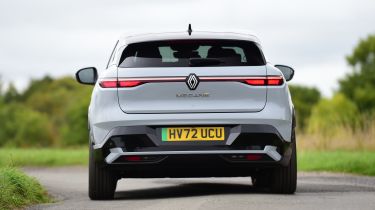Renault Megane E-Tech review: range, battery & charging
Range and rapid charging speeds are closely matched with rivals from VW and MG
| Range | Battery size | Wallbox charge time | Rapid charge time |
|---|---|---|---|
| 280 miles | 60kWh | 9hrs 45mins (0-100%, 7.4kW) | 30mins (10-80%, 130kW) |
All versions of the Megane E-Tech sold in the UK come with a 60kWh battery and a single 217bhp electric motor that sends all its power through the front wheels; enough for a range of 280 miles, according to Renault. Another version of the electric hatchback, featuring a 129bhp motor and smaller 40kWh battery, is available in other markets across Europe, but isn’t offered in the UK.
Renault Megane E-Tech range
Unlike the Megane E-Tech's main rivals – the MG4 EV, Volkswagen ID.3 and Cupra Born – only one battery is available in the Renault. The 60kWh unit is good for a range of 280 miles, according to Renault, but across a mixture of driving conditions including country roads, town and motorways, with an ambient temperature of around 15 degrees, the electric hatchback returned 3.7 miles per kWh. That equates to a real-world range of around 230 miles – 50 miles less than the car’s claimed range.
Though if you cover a lot of miles on the motorway, we found that average energy consumption fell to around 3.5 miles per kWh. At that rate, you’ll only be able to cover close to 210 miles on a full charge. Spend most of your time driving around town with the regenerative braking on the strongest setting and that figure should increase, and we’d expect to see some improvement during the warmer months of the year.
Renault has also attempted to address the Megane E-Tech’s energy consumption by fitting a heat pump, which recovers heat generated by the battery and the electric motor to warm the cabin in colder months, whilst minimising the impact on range. This is available on the range-topping Iconic model, as well as the mid-spec Techo+ which, in time, is set to replace the old Techno spec.
Charge time
The Megane E-Tech gets a maximum charging speed of 130kW, which means a 10-80% top-up takes just 30 minutes if you use a fast enough public charging point. The Renault’s rapid charging speeds are on par with the Volkswagen ID.3 and Cupra Born, but significantly faster than the Kia Niro EV which tops out at 77kW.
Using a regular 7.4kW home wallbox will require a little under 10 hours plugged in to fully replenish the battery, but a 22kW on-board charger is standard on the electric Megane. Ideal for those with access to a more powerful home wallbox, or who regularly use a public charging point capable of such speeds.




